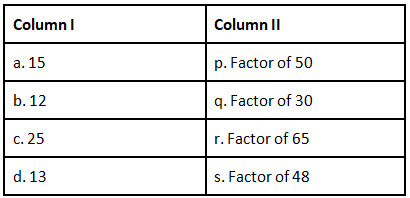Q1: Find the least 4-digit number which is exactly divisible by 8, 10, and 12.
Ans: The smallest 4-digit number is 1000.
The least number which is exactly divisible by 8, 10, and 12 will be their L.C.M.
L.C.M. of 8, 10, and 12:

L.C.M. of 8, 10, 12 = 2 × 2 × 2 × 5 × 3 = 120.
By dividing smallest 4-digit number 1000 by 120,

We find that 1000 is not exactly divisible by 120.
If we subtract 40 from 1000, we get 1000 – 40 = 960, which will be divisible by 120. But 960 is a 3-digit number. The next number to 960 which is divisible by 120 is 960 + 120 = 1080.
Therefore, the required 4-digit number divisible by 8, 10, and 12 is 1080.
Q2: Find the H.C.F of the following numbers. 27, 63
Ans: Factors of 27 are 1, 3, 9 and 27.
Factors of 63 are 1, 3, 7, 9, 21 and 63.
∴ Common factors of 27 and 63 are 1, 3 and 9.
Highest of these common factors is 9.
∴ H.C.F. of 27 and 63 is 9.
Q3: List all the multiples of 7 that lie between 125 and 142.
Ans: By checking all the numbers from 125 to 142 which are divisible by 7, we get 126, 133, 140.
So, the multiples of 7 that lie between 125 to 142 are 126, 133 and 140.
Q4: Find LCM of 60 and 40.
Ans:

LCM = 23 × 3 × 5 = 120
Q5: Fill in the blanks:
(a) 1 is neither _____ nor _____.
(b) The smallest prime number is _____.
(c) The smallest composite number is _____.
(d) The smallest even number is _____.
Ans: (a) 1 is neither prime number nor composite number.
(b) The smallest prime number is 2.
(c) The smallest composite number is 4.
(d) The smallest even number is 2.
Q6: The number of multiples of a given number is _______.
Ans: The multiple of any number is infinite as a number can multiplied till infinite.
Q7: The sum of two odd and one even numbers is
Ans: The sum of two odd numbers is always a even number.
Sum of two even numbers is even number. So when two odd numbers and one even number added is even number.
For ex. 1 + 3 = 4 (even number) and 6 + 4 = 10 (even number)
Q8: What is the Prime number?
Ans: A prime number is a natural number greater than 1 that has no positive divisors other than 1 and itself. In other words, a prime number is a whole number that cannot be evenly divided by any other whole number except for 1 and itself.
Q9: Find all the multiples of 9 upto 100.
Ans: The multiples of 9 are
9 × 1 = 9, 9 × 2 = 18, 9 × 3 = 27, 9 × 4 = 36, 9 × 5 = 45, 9 × 6 = 54, 9 × 7 = 63, 9 × 8 = 72, 9 × 9 = 81, 9 × 10 = 90, 9 × 11 = 99, 9 × 12 = 108.
Since 108 is greater than 100 therefore all the multiples of 9 upto 100 are 9, 18, 27, 36, 45, 54, 63, 72, 81, 90 and 99.
Q10: Find the H.C.F of the following numbers. 70, 105, 175
Ans: Factors of 70 are 1, 2, 5, 7, 10, 14, 35 and 70.
Factors of 105 are 1, 3, 5, 7, 15, 21, 35 and 105.
Factors of 175 are 1, 5, 7, 25, 35 and 175.
∴ Common factors of 70, 105 and 175 are 1,5,7 and 35.
Highest of these common factors is 35.
∴ H.C.F of 70, 105 and 175 is 35.
Q11: Write all the factors of the following number: 27.
Ans: 27 = 1 × 27
27 = 3 × 9
Thus, all the factors of 27 are 1, 3, 9 and 27.
Q12: State whether the following statements are True or False.
(a) A number with 4 or more digits is divisible by 8, if the number formed by the last three digits is divisible by 8.
(b) If the sum of the digits of a number is divisible by 3, then the number itself is divisible by 9.
(c) All numbers which are divisible by 4 may not be divisible by 8.
(d) The Highest Common Factor of two or more numbers is greater than their Lowest Common Multiple.
Ans: (a) True
(b) False
(c) True
(d) False
Q13: Match the following:
 Ans:
Ans:

Q14: Which of the following is divisible by 3?
15287, 15267, 152638, 15286
Ans: 15267 is the correct response.
If u Add the digits of the number i.e. 1 + 5 + 2 + 6 + 7 = 21, the sum is the multiple of 3. Therefore, the number is divisible by 3.
Q15: _____ is the factor of 68.
a)12
b)17
c)20
d) 6
Ans: B)
Sol: 68 = 2 x 2 x 17. Therefore 17 is the factor of 68.



 Ans:
Ans:





















